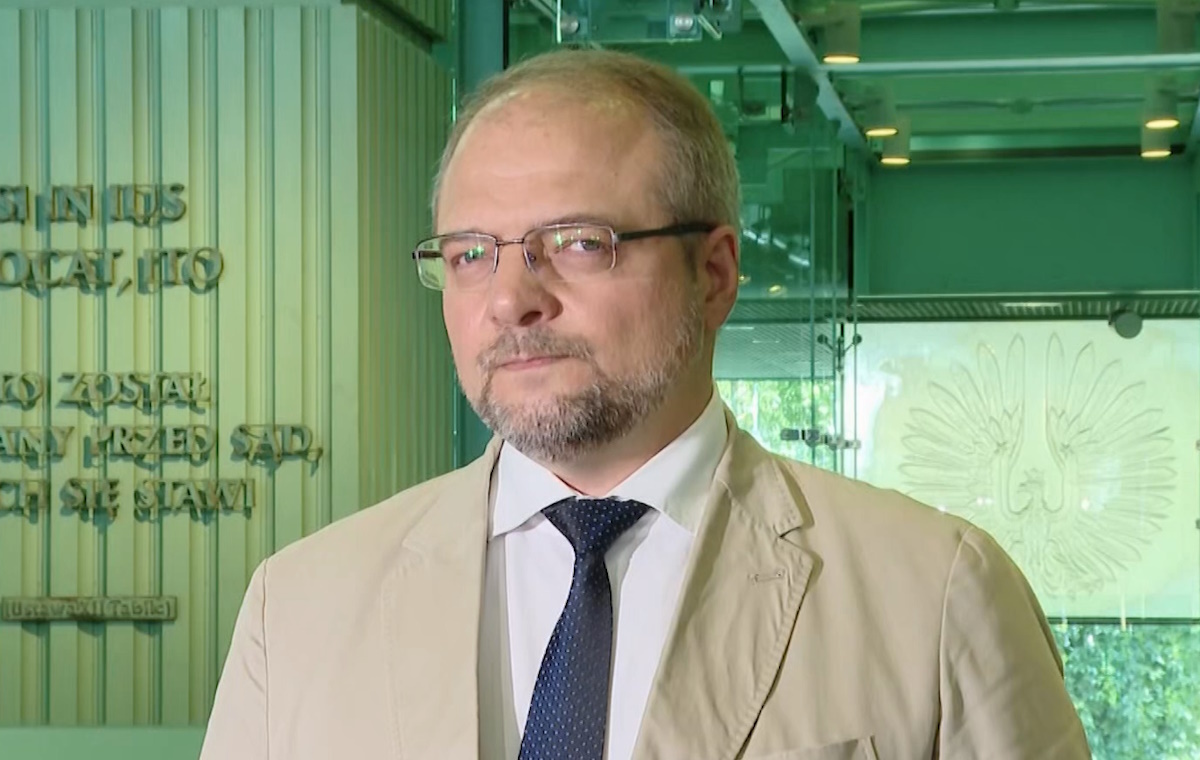Description of the facts
By order of 14.7.2021, II K 444/21, the territory Court of G. acknowledged K. W. for the responsibility of the fact that 31.3.2021 in G., he helped to dispose of the K. bicycle for the amount of PLN 300, which was obtained by means of a prohibited act, i.e. theft with burglary carried out between 24 and 31.3.2021 in G. for harm M.S., with the uncovering that the act constitutes a insignificant accident, as described in Article 291(2) of the KC, and has imposed a punishment on him for 5 months in respect of the regulation of freedom, consisting in the exercise of unpaid, controlled labour for social purposes of 30 hours in a monthly ratio, to which, pursuant to Article 63(1) of the KK, he has charged the accused with detention in the case, assuming that 1 day of effective imprisonment is equivalent to 2 days in which he has been sentenced to liberty. In addition, pursuant to Article 34(3) of the KK in Article 72(1)(4) of the KK, That court ordered the suspect K. W. during the period of the penalty, the regulation of freedom to do work in employment.
This judgement was not contested and was finalized on 20.8.2021.
The cassation was brought by the lawyer General, in whole, in favour of the convicted K. W. It alleged a gross and material infringement of the procedural law, i.e. Article 500(1) and (3) of the NCPs and Article 504(1)(4) of the NCPs, by issuing to the accused K. W. the conviction in the order procedure, even though the circumstances of the alleged offence under Article 291(1) of the KK, which did not indicate the value of the subject of the passivity, raised in the light of the evidence collected in its entirety, raised doubts as to the value of the K.'s bicycle, which was the subject of the enforcement activity of the alleged offence, which excluded the anticipation of acting in this mode and led to the request to mention the case to the proceeding in order to clarify whether the alleged offence with Article 291(2) of the KK or constituted an offence referred to in Article 122(1) of the KW.
The lawyer General has requested that the judgement of the territory Court of W. be abrogated and that the case be referred to that Court for retrial.
The ultimate Court, after having examined the cassation brought by the lawyer General in favour of the defendant, annulled the contested court order and referred the case to the territory Court of G. for retrial.
Reasons for SN
According to the ultimate Court, the cassation of the lawyer General proved to be justified, which allowed it to be examined at a sitting without the participation of the parties, under Article 535(5) of the NCP.
Procedural proceedings are a procedural law institution whose application is reserved to the most apparent cases, i.e. those in which the collected evidence is so unambiguous that it does not rise any substantive objections as to the guilt and circumstances of the alleged act. The grounds for uncertainty as to the circumstances of the act and the defendant's responsibility relate to both all the findings regarding the act and all the circumstances affecting the appropriate legal assessment of the act. It is subject to review by the court examining the substance in substance, and the existence of doubts in this respect should lead to the withdrawal of the judgement on a general basis and the examination of the case (see ultimate Court judgments of 9.2.2021 IV KK 275/20, Legalis; 7.3.2012 II KK 30/12, Legalis).
In the present case, evidence should be raised in court meriti doubts as to the fulfilment of the conditions for issuing the order judgment. First of all, there should have been a deficiency in the description of the alleged offence K. W., contrary to the requirements of Article 313(2) of the NCP, the value of the K. bicycle which was lost as a consequence of a burglary which occurred between 24 and 31.3.2021 in the basement of the M.S. And who was the subject of the suspect on 31.3.2021 helped to dispose of the perpetrator of the burglary. In describing the action of the accused, it is limited to indicating the amount K. W. received as a consequence of the sale in the pawnshop of the bike described above (300 PLN). In spite of the work arising from Article 504 § 1(4) of the NCP, the territory Court of G. did not quail. However, this fact is important, since the act under Article 291(1) of the CCC is simply a divided act, which means that it constitutes a criminal offence under Article 291(1) of the CCC or an offence under Article 122(1) of the CCC, depending on the value of the crime. due to the overfished nature of the prohibited act, the work of the court meriti – in rule – there is always a precise determination of the value of things to correctly find the rule of liability for specified an act (cf. ultimate Court judgement of 25.6.2020, III KK 138/20, Legalis; ultimate Court judgement of 25.6.2015, II KK 129/15, Legalis).
From the victim's evidence M.S. It appears that the consequence of the burglary with break-in has lost 4 bicycles: a mountain bike (silver colour) worth PLN 3,000, a dam (turquoise color) bike worth PLN 1,000, a dam (pink-white) bike worth PLN 500 and a mountain bike (violet-white colour) with a value of PLN 500. Of these bikes, only the K. mountain bike in the colour “black-blue-white”. However, in the course of the related hearing, a message on the value of the recovered property was rejected. Thus, its value was not clearly established. However, his description of the stolen bicycles, and the content of the judgement of the territory Court of G. of 3.3.2022 in Case II K 444/21, which he sentenced P.Z. e.g. for committing an offence with Article 279(1) of the KK at the time, place and in the manner described for the harm described above M.S. the full value of PLN 8,000 (including the K. bike, which was returned to the victim), obliged the convicted person, pursuant to Article 46(1) KK, to make good the harm caused in full M.S. by paying the amount of PLN 7.500 to him – it indicates that the value of the recovered mountain bike can be at the level of PLN 500.
However, it should be recalled that since 15.11.2018, i.e. both the date on which the K. W. the alleged act (i.e. 31.3.2021), as well as the date of judgement by the territory Court in G. (i.e. 14.7.2021), Article 122(1) KW designated PLN 500 as the limit between the offence of Article 291(1) KK and the offence of Article 122(1) KW, consisting in the acquisition by the perpetrator of the property of a value not exceeding PLN 500, knowing that the property was stolen or misappropriated, or aid to the disposal of specified property, or in order to get the property benefit of specified property, or aid to conceal it.
It is so correct that, in specified circumstances, the territory Court in G. should consider whether the defendant’s conduct K. W. in fact, the nature of the offence under Article 291(2) of the KK or the offence under Article 122(1) of the KK. This implied referring the case to a proceeding in order to resolve the doubts raised as to the value of the property.
Failure to comply with that work does not mean that the conditions for issuing the judgement in question have been fulfilled in the course of the proceedings. It cannot be concluded that in the case there was no uncertainty as to the circumstances of the action and the defendant's fault, which leads to the conclusion that there has been a serious breach of Articles 500(1) and (3) of the NCP which may have had a crucial impact on the content of the judgment.
Comment
It is worth recalling that the ultimate Court resolution of 24.9.1997, I KZP 15/97, Legalis, where it is clearly indicated that the offence of Article 122 § 1 KW may besides be the subject of the burglary theft if its value does not exceed the value in force at the time for the offenses of tallness (see, inter alia, ultimate Court judgments: 11.3.2022, II KK 34/22, Legalis; 21.5.2020, III KK 63/20, Legalis; 16.3.2016, III KK 38/16, Legalis; 12.2.2016, III KK 490/15, Legalis; 25.6.2015, II KK 129/15, Legalis; 7.11.2014, II KK 298/14, Legalis).
















